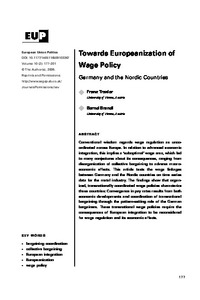Towards europeanization of wage policy: Germany and the Nordic Countries

Traxler, Franz ; Brandl, Bernd
2009
10
2
177-201
collective bargaining ; European integration ; wage policy
Wages and wage payment systems
http://doi.org/10.1177/1465116509103367
English
Bibliogr.
"Conventional wisdom regards wage regulation as uncoordinated across Europe. In relation to advanced economic integration, this implies a ‘suboptimal' wage area, which led to many conjectures about its consequences, ranging from disorganization of collective bargaining to adverse macroeconomic effects. This article tests the wage linkages between Germany and the Nordic countries on time series data for the metal industry. The findings show that organized, transnationally coordinated wage policies characterize these countries: Convergence in pay rates results from both economic developments and coordination of transnational bargaining through the pattern-setting role of the German bargainers. These transnational wage policies require the consequences of European integration to be reconsidered for wage regulation and its economic effects. "
Digital
The ETUI is co-funded by the European Union. Views and opinions expressed are however those of the author(s) only and do not necessarily reflect those of the European Union or the ETUI.